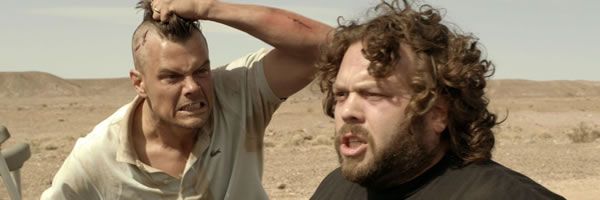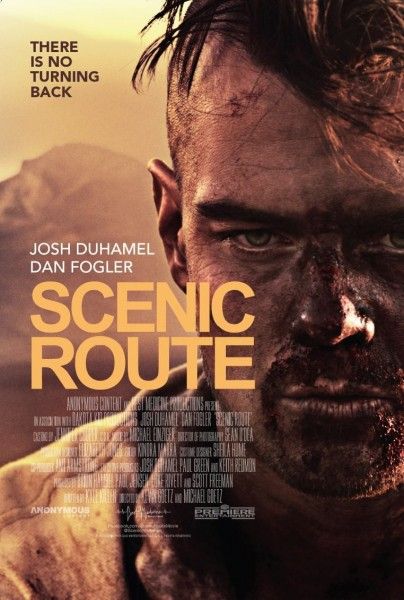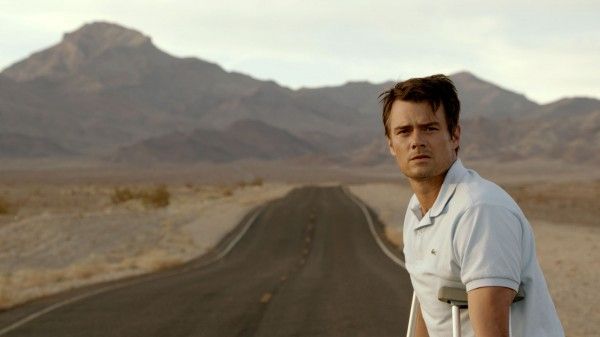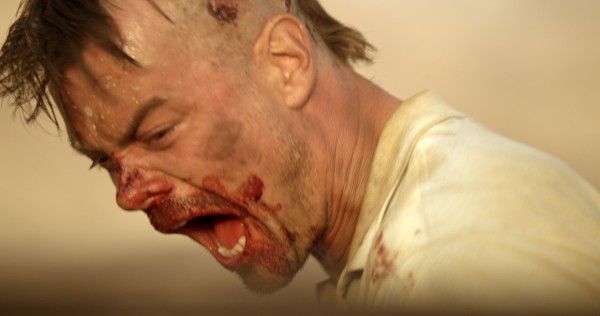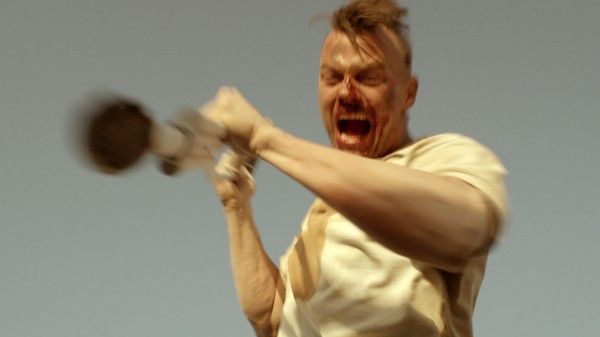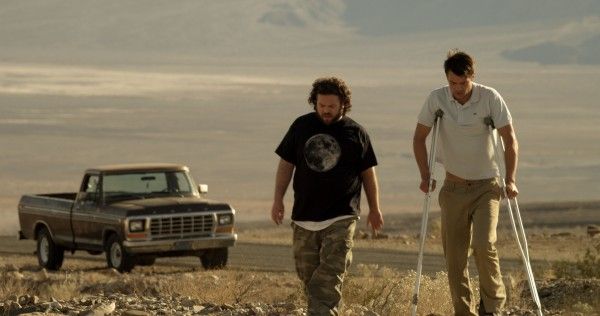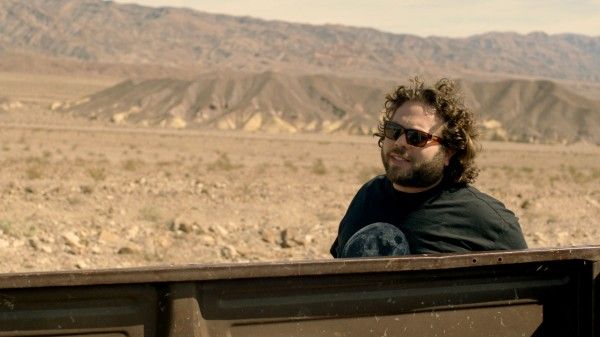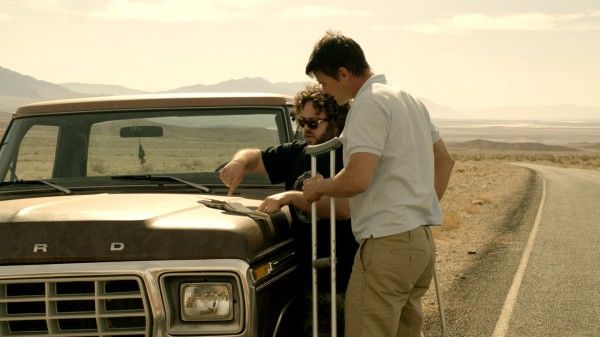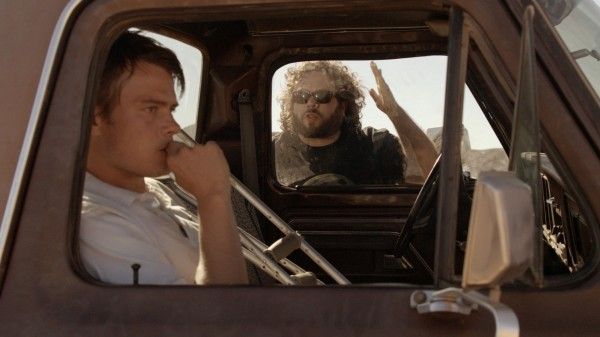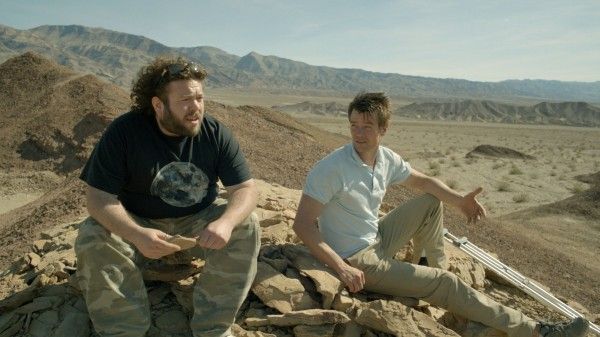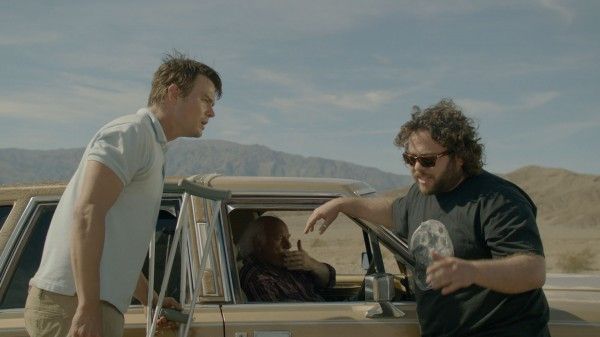Scenic Route is directed by Kevin Goetz and Michael Goetz and stars Josh Duhamel and Dan Fogler as life-long friends who get stranded in the desert when they decide to take a scenic route. What starts out as an opportunity to get reacquainted turns into a road trip from hell after their pickup breaks down on an isolated stretch of desert highway. As they question who they are and who they could have been, their agitation leads to physical confrontation and what begins as an inconvenience becomes a very real life or death struggle.
At the film’s recent press day, Duhamel, Fogler and the Goetz Brothers talked about the challenges of bringing to life a movie set in a single location that hinges on the performances of only two actors, the seamless directing process, their shared sensibility, creating an atmosphere that fostered great performances by letting the action play out, dealing with extreme temperatures and unpredictable dust storms while shooting in Death Valley, Duhamel’s Mohawk hairstyle, and choreographing an unusually awkward and brutal fight sequence. They also discussed their upcoming films: Duhamel’s Strings and You’re Not You, Fogler’s Don Peyote, and the Goetz Brothers’ The Violent Separation. Check out the full interview after the jump.
JOSH DUHAMEL: For the most part, we were pretty lucky early on in this movie. It wasn’t as hot as I thought it was going to be. It was 75, 85, sometimes it got to 90 degrees. And then, there were moments when it got scary with dust storms and the barometric pressure dropped, and it went from 75 to 36 degrees before lunch. So we couldn’t go back to work because it was just too…
DAN FOGLER: It was zero visibility.
DUHAMEL: But it actually worked in a lot of places for the movie, I thought.
FOGLER: It was its own character. It was like the third character out there with us and made it easy to act like we were scared for our lives.
DUHAMEL: I remember the grave digging scene, when I was digging his grave, is when we were worried this wasn’t going to match to what was happening before. And then, we thought it was great because of the mood for digging a grave. It was almost perfect weather. You couldn’t have asked for this. It would have been very expensive to try to do in a big budget movie.
MICHAEL GOETZ: If we had to force it.
DUHAMEL: So it actually worked for us in a lot of ways.
MICHAEL GOETZ: These guys were troopers. We’d be sitting out there, like Josh was saying, and it would be 30 to 40 mph winds at night and 30 degrees, and we’d say, “Get in the hole.” If you look at Josh or Dan in this hole, you’d think it would be warmer in there, but it wasn’t. It was very cold in there.
DUHAMEL: It was supposed to be. The idea was that it was a lot warmer in there, but no.
MICHAEL GOETZ: It wasn’t. It was actually colder. And then, all of us are standing around, the whole crew, and we’ve got ski masks and hats, and we’re just bundled up like we’re in Alaska. It was cold. When he’s shivering, he’s really shivering.
Josh, when Mitchell makes his confession about how he feels about being married and being a father, was that hard to do?
DUHAMEL: Yeah, it was difficult for me. I actually asked these guys, “Do we have to keep this in the movie? I feel gross even saying it.” But it was one of those moments where this character was stuck in life and was at a point where he didn’t know if he’d made the right decision. He’d gotten into his head and it’s actually true this guy doesn’t know if he made the right decision. Does he really love his wife? Does he love his life? He says some things that are pretty unredeemable in a lot of ways, and that was my worry. Do we keep this? This might go too far. But that’s what this movie is, and this is the reason I did it. It’s because this is a brutal, honest look at two guys who are trying to figure out whether or not they’re ever going to achieve the things they set out to when they were younger. And if they don’t, is that okay?
How was the filmmaking experience different given that it’s just the two of you acting together throughout every bit of the film? Was that unusual and different from other films where you have a bunch of different actors and scenes?
FOGLER: Yes. What attracted me to the script was that it felt like a play. It’s like Waiting for Godot. We actually had these long, long scenes, like 20-minute takes. That’s unheard of, where you’re usually just working on the minutiae throughout an entire cutting and stopping, and trying to work yourself up again. That’s even more difficult than being able to play through an entire scene and just walk the tightrope, and if something goes wrong, screw it. We just kept the ball up in the air and a lot of the magic comes out of that, like the door being kicked during this long, elaborate scene. A lot of little physical gems would come up that we would just go with, and that was freeing. I love that aspect of the film. We had so much rehearsal. I felt like the chemistry was there and we felt like old friends. I wish I had a rehearsal for a lot of the movies I did. Some things you don’t want it, but …
DUHAMEL: This one you needed it. I mean, it was so imperative to make this movie work. We needed this kind of time to rehearse. I was on the movie first and met the Goetz brothers. We knew that the only way this movie would work was if we found somebody who understood the kind of work that it would take to pull it off because there’s a lot of dialogue in the beginning, as you know. It took a guy like Dan to understand that and jump in and do the kind of work that it took. For me, when I first read it, I had to do this movie. I never had a chance to do something like this. I’d been looking for something like this. It was scary because it all pretty much was on our shoulders the whole time. We had to try and bring this movie about two guys stuck on the side of the road to life and that was the challenge. And working with these two, who I think are incredibly talented, the Goetz brothers, I met them early on and they had the same ideas and more than I did. They were brave enough not to try to overshoot it. What I loved about what they did was it reminded me of a movie from the 70s. They didn’t need to do that much crazy camera stuff. They just let it play out. A lot of times, directors want to try to show off how creative they can be with the camera. These two were confident enough in their own abilities that they didn’t need to show that.
MICHAEL GOETZ: We were so confident in these two. We were looking for a project that was going to live and die by the performances. It was a big deal for us in casting trying to find the right two and we did. I remember in Death Valley the first day, the first take was 17 minutes long, and we just sat there. The crew never reads a script and they were standing around. We just watched this bit of theater play out in the desert for 17 minutes, and it was transforming. The whole crew knew from that moment that this was going to be something special.
FOGLER: I remember when you cut, everyone started clapping. It felt like a play.
MICHAEL GOETZ: It was cool.
DUHAMEL: No, no. (laughs) They were clapping because it was finally over. They thought it was never going to end.
Josh, what was your first reaction when you saw your Mohawk hairstyle?
DUHAMEL: Well, this was another big reason why I wanted to do this movie because I got a chance to get a Mohawk. I mean, how many chances am I going to get to do that in my life? It looked pretty gnarly, but it’s like a man walking around with a handlebar mustache.
FOGLER: You pulled it off, man.
DUHAMEL: He gets a lot more respect. My buddy just did this for the buddy game weekend last weekend. He came with this full on handlebar mustache that he dyed black. He goes, “You wouldn’t believe how much more people respected me at the airport. They didn’t give me any shit when they looked at my ID. They just said, ‘Okay, thank you, sir.’” It’s the same thing with a Mohawk. It automatically commands respect. Anybody with a Mohawk is a little bit out of their mind. And so, therefore, people are maybe a little bit more lenient.
Did you cut most of it off in front of the camera?
FOGLER: I cut a little bit on camera, but it was mostly the hair person who came in and made it even.
DUHAMEL: It would have taken us all night to cut it with those…
FOGLER: …with the little scissors. Yeah.
DUHAMEL: In the movie, we had all night, but for shooting purposes, we had to cheat it a bit.
What was your wife’s reaction?
DUHAMEL: She loved it.
How many months did you keep it?
DUHAMEL: I just let it grow. I never cut it. It was strange. Dan’s got another movie that’s coming out called Don Peyote and he was like, “Dude, did you cut your Mohawk yet?” I was like, “No.” It was weird looking because my hair grows straight out of my head so I looked like a baby chicken. Their hair is all fuzzy and that’s what mine does. But then, I had this long sort of thing, and so he had me come and do this little cameo in his movie.
FOGLER: We used it. He was like a birdman living in the trees, like a freegan, and he’s pretty brilliant in it. We put these red feathers in his hair. He looked great.
DUHAMEL: I looked like a freak.
FOGLER: He looked like Mad Max Freegan or something.
What was it like working with two directors and how was the process different?
FOGLER: I thought it was great. When I first read it, I was like this has got to be like a dark existential comedy done by the Coen Brothers where you’ve got everything in one movie. I sat down with them and they were like, “Yes, that’s what we want to achieve as well” and I was like, “Okay.” We were all on the same page. And then, on set, we had a blast. They had a lot of confidence in us. Right away, I knew these guys knew what they’re doing. There was a lot of trust.
DUHAMEL: I was worried about it at first because I didn’t know. One of them has got to be obviously more dominant. There’s got to be some in-fighting between the two of them. There’s going to be some kind of drama. I don’t know if it was because they were both so prepared, or because they both made sure they were on the same page beforehand, or whatever it was. They’ve worked together forever. They grew up together, and I think they truly share the same brain. You can ask a question to one of the brothers, and you can go ask the same question to the other brother, and they’re so much on the same page that you’ll get the same answer.
FOGLER: But it wasn’t a bombardment where you’re getting anything conflicting. It was like one would come up and converse, and the other would come up and you’d get the direction, and then it was seamless.
DUHAMEL: (to Kevin and Michael Goetz) I’m curious, what do you guys think? Is it the prep or is it something that you…?
KEVIN GOETZ: It’s that we have the same sensibility. That’s the key. We have the same taste. And then, it’s the prep. We have to be on the same page for you guys and for everybody else. So we prep harder than a single director might have to because we have to be on the same page, which gives us a bigger vocabulary to draw from, and we get to use each other’s energy. It’s like, “Mike, your turn. I’m thinking about the next shot and what we do with the set-up. You go talk to them about this particular scene.” And then we switch off.
MICHAEL GOETZ: Right.
DUHAMEL: But is there arguing that goes on?
KEVIN GOETZ: The only arguing that goes on might be before we’re ever around with any of you guys. It might just be whoever is more passionate is like, “This is why I think we should do it” and the other one’s like, “Alright. You’re more passionate about it, then that’s the way we’re going to go.” That’s how we get over any bumps. It’s just the sensibility. We both know what we like.
DUHAMEL: Do you guys secretly dislike each other?
MICHAEL GOETZ: (laughs) I’m kicking him right now.
KEVIN GOETZ: You just stepped on my toe!
MICHAEL GOETZ: It works.
Have any of you ever gotten lost or stranded in real life and what did you do about it?
DUHAMEL: I had a close one. It was a completely different situation obviously. I was a high school kid in North Dakota. It was me and my buddy, one of my oldest friends, Greg Shedder. I was on my way out to my girlfriend’s house at the time. She lived out in the country. It was a snowstorm. I remember going over this gravel road, but there was a blizzard going up and down it, and as we came down, the car started sliding off into a ditch. Had we tried to get out to go walking, we never would have made it. We were too far. It was completely black out there. It took us probably an hour to finally get the car to a place. It was an old ’77 LTD. It was my boat, but not an off-road vehicle. We were finally able to get it out. I don’t even remember how we did it, but had we not, I don’t know what we would have done. There were no cell phones at the time.
But you’re here.
DUHAMEL: Yes. I was so brave. Dan, you must have had one?
FOGLER: (joking) You must have got lost somewhere, Dan. You have no sense of direction. I’m sure I have. I remember getting lost when I was a kid at the mall and just crying the entire time until my mom came. I stayed in one place and cried. It was pretty scary.
DUHAMEL: That was just last year.
FOGLER: I didn’t know what to do so I called my mother.
MICHAEL GOETZ: You guys got lost on the way to Death Valley, too.
FOGLER: Yeah, we got lost on the way to Death Valley, and we got lost on the way sometimes to the set. I was walking in Griffith Park one time with my wife and she’s healthier than I am. We were walking through there and she was just trekking up these hills. Halfway through, I’m already like (wheezing), “I don’t think I can make it. I don’t think so.” And she was like, “Um, I’m lost.” “How long have you been lost?” It had been for a while, and we were just walking in circles and didn’t see anybody. You get into certain places in the park where you see the city, but you’re like, “How do I get there?” That was scary. We were lost for about a half hour. (laughing) And that was in the city! I thought we were going to die. We ran out of water pretty quick. And then, some guy jogged up and said, “Hey, follow me!” “Thank God you came!”
How did you guys work out the choreography for the fight scene?
KEVIN GOETZ: We had a great stunt coordinator who came out and helped us out.
DUHAMEL: The idea was we wanted to figure out what a writer and a banker with a lot of rage would be like. It had to be a little bit funny, but it also had to be kind of brutal.
FOGLER Awkwardly brutal.
DUHAMEL: That fight was one of my favorite things in this movie. It’s two guys with no business or no experience fighting, doing some pretty below the belt stuff – biting and pinching and throwing sand.
FOGLER: Noogies.
DUHAMEL: And crutching, kicking in the nuts, the whole thing. So, it was kind of funny, but at that point in the movie is literally when it takes a dark turn.
Are you guys good at fighting in real life?
FOGLER: Yeah, I’m a good fighter.
KEVIN GOETZ: I wouldn’t fight you.
DUHAMEL: I wouldn’t fight him.
FOGLER: I take kung fu. I do a little mixed martial arts. I could probably hurt somebody with this if I wanted to (picking up the microphone).
KEVIN GOETZ: But they did all their own fighting, too, in the movie.
FOGLER: I love physical and stage combat. I was looking forward to that. We had a lot of fun.
Can you talk about what you’re working on next?
DUHAMEL: Right now, it’s baby time so I’m going to be home. And then, I’ve got a bunch of projects that are in development that my company, Dakota Kid Productions, is producing which I’m really excited about. It’s going to give me some time to be home for that. This is the first movie I’ve ever been a producer on. I just finished a movie called Strings which I shot in Winnipeg and a movie with Hilary Swank that should come out later this year called You’re Not You.
FOGLER: I’m really excited about this movie I directed and Josh is in with his Mohawk, Don Peyote. It’s the one we talked about. This is our logo.
DUHAMEL: It’s actually really good. Crazy, but it’s good.
FOGLER: (to Kevin and Michael) You guys have got to see the new cut.
DUHAMEL: Smoke a lot of weed and then watch it.
FOGLER: That’s what it says on the poster.
DUHAMEL: Is that what it says on the poster? It’s crazy because it’s about this guy who goes down the rabbit hole in this conspiracy and slowly loses his mind. It’ll be in the middle of one thing, and then all of a sudden, it’ll go into full song and dance. Everybody is choreographed. It’s insane.
FOGLER: It’s like Woody Allen meets Fear and Loathing in Las Vegas. I’m really psyched about that.
KEVIN GOETZ: It’s a trip. We saw an early cut and we’re going to see a new one.
What about you guys? What’s next for you and Michael?
KEVIN GOETZ: We’re in development on a new feature script. It’s another drama, family, 1980’s, Montana, crime, very similar to this in a lot of ways with the same kind of themes, but in more than one location and with more than two actors. It’s called The Violent Separation.
MICHAEL GOETZ: In theaters in two years.
Josh, I know you’ve been very busy with the press tour. Are you excited that you’re going to be a dad?
DUHAMEL: There’s a lot of anticipation going on at the Duhamel household right now. It’s pretty exciting. I’m mostly impressed with how gracefully Fergie has been. She’s just been awesome through this whole thing. She’s taking good care of herself. She’s happy. She’s in great spirits. She looks beautiful. I’m just proud of her more than anything, and we’re really excited to meet this little dude. I can’t wait.

